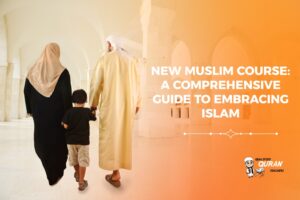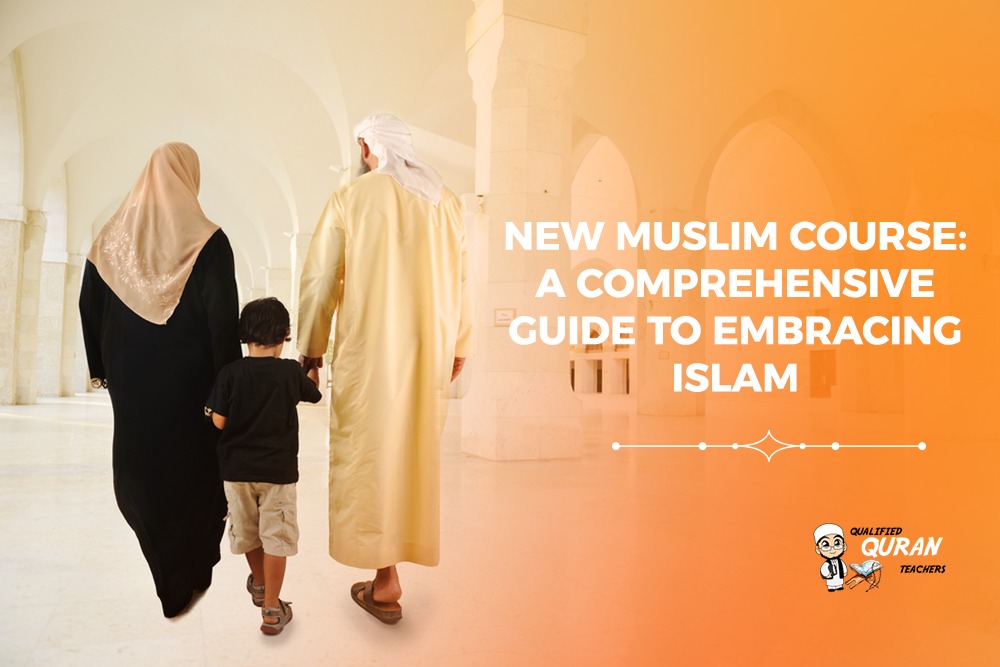New Muslim Course: A Comprehensive Guide to Embracing Islam
Introduction
Embracing Islam is a significant, transformative journey that brings a profound sense of fulfillment, peace, and purpose. This course is tailored to guide new Muslims through their spiritual and practical journey in Islam. It covers the essential teachings, the beauty of worship, and the comprehensive lifestyle that Islam advocates. This article serves as a starting point for those eager to learn about Islam, offering insights into its practices, beliefs, and the vibrant community of believers.
What is Islam?
Islam is not just a religion; it’s a complete way of life that emphasizes belief, worship, and conduct based on the Quran and the Sunnah of Prophet Muhammad (PBUH). At its core, Islam calls for the worship of one God (Allah), believing in the finality of the prophethood of Muhammad (PBUH), and living a life by the Quran and Hadith.
The Five Pillars of Islam
The foundation of a Muslim’s faith and practice is built on five pillars: Shahada (faith), Salah (prayer), Zakat (charity), Sawm (fasting during Ramadan), and Hajj (pilgrimage to Mecca). These pillars are not just acts of worship but are guiding principles for social justice, personal discipline, and spiritual growth.

Understanding the Holy Book: The Quran
The Quran is the word of God revealed to Prophet Muhammad (PBUH). It guides living a righteous life, understanding God’s will, and connecting with Him deeply and personally. This section explores how to approach Quranic studies and the themes and messages that resonate throughout the holy text.
Prophetic Traditions
The Hadith, sayings, and actions of Prophet Muhammad (PBUH) complement the Quran by offering guidance on practical aspects of living an Islamic life. Learning from his life teaches us about kindness, justice, and humility.
The Art of Purification and Prayer
Through Wudu (ablution) and Ghusl (full body wash), purification is a prerequisite for prayer, demonstrating the importance of cleanliness and preparation before standing before Allah. Salah, the Muslim prayer, is a direct link between the believer and God, performed five times daily as a testament to faith and devotion.
Zakat and Fasting
Zakat, the obligatory charity, purifies wealth by redistributing it to those in need, fostering a sense of community and empathy. Fasting during Ramadan brings Muslims closer to God and instills patience, self-discipline, and compassion for the less fortunate.
Hajj: The Pilgrimage
The pilgrimage to Mecca is a once-in-a-lifetime obligation for physically and financially capable people. It is a profound act of worship and equality where millions of Muslims from diverse backgrounds unite.
Living as a Muslim
Adhering to halal dietary laws, dressing modestly, managing finances Islamically, and nurturing a harmonious family life are all aspects of living as a Muslim. This lifestyle is about balance, respect, and mindfulness in every action.
Spirituality and Personal Development
Islam places a strong emphasis on personal development through spirituality. Tazkiyah, or purifying the soul, involves constant self-evaluation and striving to align one’s life with Islamic principles. Connecting with Allah is central to overcoming life’s challenges and finding peace.
Islamic Community and Society
Being part of the Muslim Ummah (community) is more than shared faith; it’s about supporting each other, contributing to society, and fostering a sense of belonging. The mosque plays a vital role in community life, offering a space for worship, education, and social activities.
Interfaith Relations
Islam teaches respect and understanding towards other religions. Promoting peace and mutual understanding is essential in today’s globalized world, where Muslims are
Part of a diverse tapestry of faiths and cultures. This section explores how Islam encourages dialogue and cooperation among different religious communities, emphasizing common values and the pursuit of shared goals for humanity’s betterment.
History and Culture
The rich history of Islam is filled with pivotal events, achievements, and figures who have made significant contributions to civilization. From the golden age of Islamic scholarship, which saw advancements in science, medicine, and philosophy, to the notable women and men who have shaped Islamic thought and society, this section delves into the heritage that continues to influence the world today.
Modern Challenges and Islam
Navigating contemporary issues while adhering to Islamic principles can be challenging for new Muslims. This section addresses how to apply timeless Islamic teachings to modern dilemmas, including technology, social justice, and environmental stewardship, providing a framework for living an Islamic life in the 21st century.
Islamic Ethics and Morality
At the heart of Islam is a robust ethical framework that governs personal behavior and societal interactions. This part of the course examines the Islamic perspective on ethics and morality, drawing on Quranic verses and Hadith to highlight the importance of honesty, compassion, and justice in all aspects of life.
Education and Learning in Islam
Islam places a high value on the pursuit of knowledge, encouraging Muslims to learn and grow intellectually, spiritually, and morally. This section emphasizes the importance of education in Islam, exploring how learning is considered an act of worship and a means to better understand the world and one’s purpose in it.
Health and Well-being
Islam recognizes the close connection between physical health, mental well-being, and spirituality. This section offers guidance on maintaining a healthy lifestyle according to Islamic principles, including the importance of diet, exercise, and mental health awareness, reflecting the holistic view of well-being in Islam.
Islamic Finance and Economy
Islamic finance is based on ethical principles that promote fairness, transparency, and equity. This part of the course introduces the basics of Islamic finance, including prohibitions on interest and speculative transactions, and explores how these principles can be applied in daily financial decisions and the broader economy.
Women in Islam
Islam grants women rights and responsibilities that have been enshrined since the 7th century. This section highlights the role and status of women in Islam, addressing common misconceptions and celebrating the contributions of women to Islamic society throughout history.
Youth and Islam
Engaging young Muslims and addressing their unique challenges is crucial for the future of the Islamic community. This section focuses on how Islam speaks to the concerns of the youth, offering guidance on issues such as identity, social pressures, and the search for purpose while encouraging active participation in religious and community life.
FAQs about Islam and Being a New Muslim
This part addresses common questions and concerns that new Muslims may have, ranging from how to navigate religious practices and community life to dealing with misconceptions about Islam. It provides clear, concise answers to help build confidence and understanding.
Conclusion and Moving Forward
The journey of learning and growing in faith is a lifelong process. This concluding section offers encouragement and advice for new Muslims on continuing their exploration of Islam, finding resources and support, and becoming active, contributing members of the Muslim community.
FAQs
- How do I perform the five daily prayers?
- Prayer times are determined by the position of the sun in the sky, and each prayer has specific steps and recitations. Many mosques offer classes, and there are numerous online resources and apps to guide you through the process.
- Can I read the Quran in my own language?
- Yes, while the Quran was revealed in Arabic, translations are available in many languages. Reading a translation can help you understand the meanings, but learning Arabic can deepen your connection to the original texts.
- What should I do if my family is not Muslim?
- Islam teaches respect for parents and family, regardless of their faith. Open, honest communication and demonstrating the positive changes Islam brings to your life can help bridge understanding.
- How can I find a supportive Muslim community?
- Look for local mosques, Islamic centers, and online forums and groups. Many communities offer classes, social events, and support for new Muslims.
- Are there any dietary restrictions I should be aware of?
- Muslims are required to eat halal food, which excludes pork and alcohol. Halal meat must be slaughtered in a specific way. Many areas have halal grocery stores and restaurants.
- What if I make mistakes while learning about Islam?
- Islam is a religion of mercy and forgiveness. Making mistakes is part of the learning process. What matters is your intention and effort to learn and grow in your faith.

